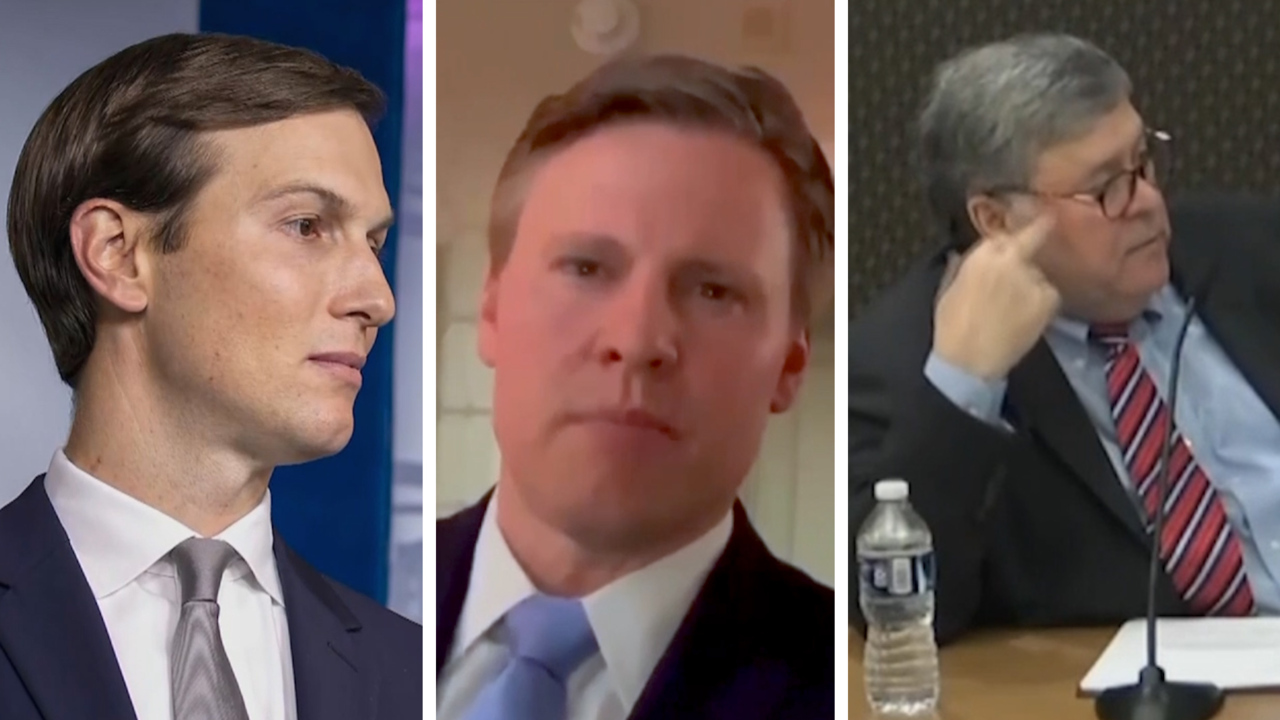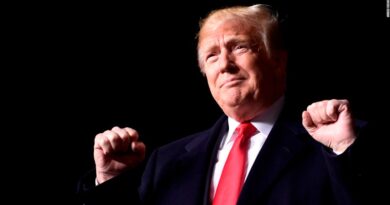Jan. 6 panel makes case election fraud claims were Trump vs. ‘Team Normal’

Stepien. Attorney General Bill Barr. Campaign aides Matt Morgan and Alex Cannon. Barr’s successor Jeff Rosen. Rosen’s deputy Richard Donoghue. White House advisers Eric Herschmann and Derek Lyons. All delved into the fraud claims that gained Trump’s favor, according to testimony aired Monday, and all told Trump there was nothing to them.
But Trump shunted Stepien and others aside in favor of Rudy Giuliani — who, while “apparently inebriated” convinced Trump on Election Night to declare victory — and Sidney Powell, the two attorneys who drove Trump’s fraud claims when others would not.
Morgan, the campaign counsel, described in another video how outside lawyers who had signed up to help on Election Day “disengaged with the campaign,” in part because “law firms were not comfortable making the arguments that Rudy Giuliani was making publicly.”
Most of the aides did not speak out publicly on their attempts to quell Trump’s efforts, even as the lies grew more pronounced and were accepted by swaths of voters. Instead, they privately told the then-president he was wrong and counseled him to back off some of the more extreme claims. Those claims included: that a suitcase of ballots seen on camera in Georgia’s State Farm Arena was evidence of fraud, that thousands of dead people voted in multiple states and that Dominion voting machines were shifting votes from Trump to Joe Biden.
The committee also spun its debunking attempts forward to more recent disinformation efforts, airing a lengthy clip of Barr dismantling the premise of the recently released film “2,000 Mules,” which Trump touted as the long-elusive evidence of 2020 election fraud.
“Before the election it was possible to talk sense to the president. And while you sometimes had to engage in a big wrestling match with him, it was possible to keep things on track,” Barr recalled. “I felt that after the election … he wasn’t listening to advice from me.”
Trump’s aides characterized him as increasingly cloistered within a shrinking group of advisers willing to push his claims, while he ostracized so-called Team Normal. He elbowed aside his campaign legal team in favor of the Giuliani-Powell effort after they refused to validate his fraud allegations. He sought to replace the leadership of the Justice Department for the same reason — only to back down amid a mass resignation threat.
Monday’s hearing didn’t absolve his other aides of blame either, however, as lawmakers showed that Trump campaign officials used fraud claims — that they apparently called wrong in private — to raise more than $250 million in the weeks following the Nov. 3, 2020 election. That included $100 million in the first week, as fundraising emails urged donors to contribute to an “Election Defense Fund.” No such fund existed, campaign aides told the select committee.
The select committee also showed that even before the election, some of Trump’s top political advisers had urged him to embrace mail-in voting — hopeful that a proliferation of the practice amid the Covid-19 pandemic could benefit Republicans, who had a strong ground game. Stepien and House GOP Leader Kevin McCarthy met with Trump in the summer of 2020 to press him on that, according to video testimony, with both Stepien and McCarthy urging Trump to support the practice.
But Trump refused, Stepien said, and instead worked to convince supporters that mail-in voting was a bastion of fraud that would result in an illegitimate election. Trump pushed that argument all the way through Election Day, and then used the slow pace of counting mail-in ballots in certain states to claim he was being cheated, the committee indicated.
Lawmakers showed that Trump’s predilection for listening to Giuliani over his closest advisers — and even family members like Jared Kushner who urged him to treat the former New York City mayor with skepticism — began immediately after the election.
“There were suggestions by, I believe it was Mayor Giuilani, to go and declare victory and say that we’d won it outright,” former Trump adviser Jason Miller said in a video of his interview played by the select panel. Both Miller and Stepien told the panel in testimony that Giuliani appeared intoxicated at the time.
“My recommendation was to say that votes were still being counted. It’s too early to tell, too early to call the race,” Stepien told the committee. But Trump disagreed, instead delivering a combative statement that declared victory and alleged widespread fraud. Those claims were later proven false.
“Frankly, we did win this election,” Trump said on Nov. 4, 2020.
The Jan. 6 select committee used Monday’s second of six scheduled public hearings to highlight the corrosive effect of Trump’s lie and his weeks promoting it with the help of political allies. Those lies served as scaffolding to support every other aspect of Trump’s effort to remain in power, from his push to get the Justice Department to legitimize his false claims to the pressure he piled on then-Vice President Mike Pence to derail the transition of power.
Eventually, Trump’s false claims of widespread fraud masking his victory fueled the mob the battered its way into the Capitol on Jan. 6, 2021 — and the select committee says it intends to show in the coming hearings that messages from Trump and his allies may have helped radicalize rioters. The select committee aired videos of rioters at the Capitol echoing some of Trump’s false claims of fraud.
The panel also heard from Stepien’s attorney, Kevin Marino, who testified instead after Stepien had a family emergency.
Former Fox News political editor Chris Stirewalt, who was fired in January 2021, gave testimony as well. Fox drew Trump’s outrage after the network became the first to call the battleground state of Arizona for Biden, a projection that ultimately held true. Stirewalt has attributed his ouster to his decision to defend that Arizona call, while the network has said his departure was part of a digital restructuring.
The hearing featured a second panel that included prominent GOP elections attorney Ben Ginsberg, former Philadelphia City Commissioner Al Schmidt and former U.S. Attorney for North Georgia BJay Pak, who resigned amid Trump’s effort to overturn the election results.
Pak previously testified to the Senate Judiciary Committee about the pressure Trump and his allies applied on him and other officials to get them to investigate false claims of election fraud.


